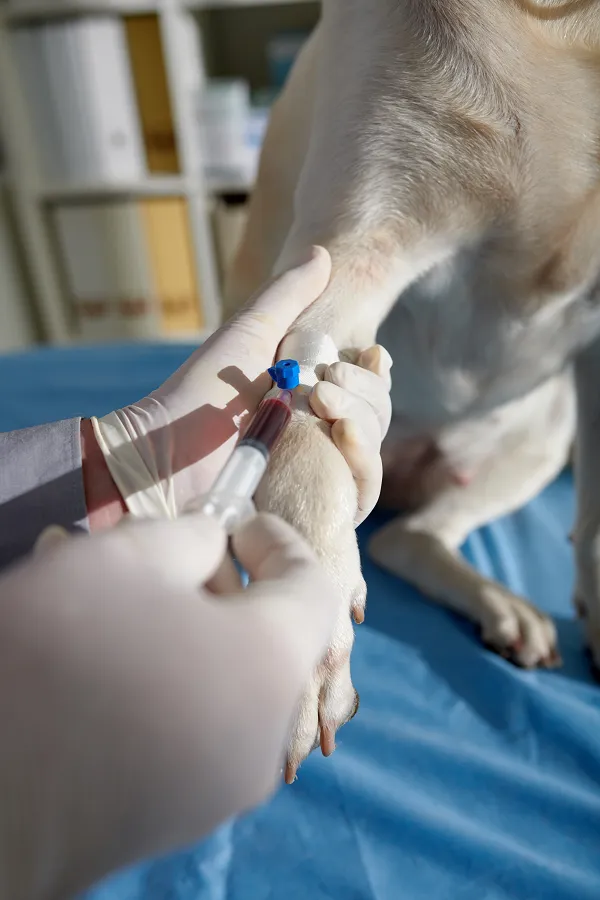Testing for Liver Disease

Initial screening tests for liver disease include a complete blood count (CBC), biochemistry panel, and urinalysis. Bile acid testing can be used to detect problems in liver function. More advanced diagnostics to determine the cause of liver disease include abdominal ultrasound, fine needle aspiration of the liver, or liver biopsy. Testing for various infectious diseases, including leptospirosis, may also be indicated.
Testing for Leptospirosis in Dogs

There are several tests for diagnosing leptospirosis, but the two most common ones are the DNA-PCR test and the microscopic agglutination test (MAT). Infection can be diagnosed with either test, but each has weaknesses, and in some situations, both tests may be needed to reach a diagnosis.
Testing for Lameness

Lameness in your pet can be due to many possible causes. Examination may help determine the cause, but further testing may include radiographs, blood tests, or joint aspirations to help accurately determine the cause. Treatment and prognosis for the lameness will depend on the underlying cause.
Testing for Kidney Disease

Tests to diagnose kidney disease include complete blood count (CBC), serum biochemistry, and urinalysis. Further diagnostic tests may be recommended based on the results of these initial screening tests. The additional tests help to identify the cause and severity of kidney disease, which will help determine the best treatment plan for your pet.
Testing for Jaundice

Jaundice is caused by the build-up of bilirubin in the tissues due to high blood levels of bilirubin (hyperbilirubinemia) in the blood. Hyperbilirubinemia occurs either due to increased red blood cell destruction (hemolysis), or an inability of the liver to process or excrete bilirubin normally. CBC, biochemistry panel, and urinalysis are tests used to further define the cause of jaundice. Further diagnostics that may be needed and include ultrasound, X-ray, FNA, liver biopsy and/or bacterial culture from fluid found in or around the liver. More specific tests for infectious diseases include FeLV, feline coronavirus, and fungal testing.
Testing for Increased Thirst and Urination

Various conditions can cause increased thirst (polydipsia) and urination (polyuria). Based on your pet’s history and a thorough physical examination, your veterinarian will recommend diagnostic testing to determine the cause. This handout describes several tests that can be performed along with the conditions the results from these tests may indicate.
Testing for Increased Appetite

An increased appetite can be normal in pets that have higher than normal energy requirements, as growing puppies and kittens, pets that exercise strenuously, such as hunting dogs, and pregnant or nursing females. Many diseases can cause an increased appetite, including hyperthyroidism in cats, Cushing’s disease, intestinal disease, diabetes or insulinoma, intestinal parasitism, and cancer. Increased appetite can also be caused by certain medications, such as corticosteroids. Diagnosis generally requires a thorough history, physical exam, complete blood count (CBC), biochemistry panel, thyroxine (in cats), and urinalysis. Additional diagnostic testing may be required.
Testing for Inappropriate Urination (Urinating in the House)

Inappropriate urination happens in well-trained pets for many reasons, including inflammation, infection, estrogen deficiency, kidney failure, diabetes mellitus, diabetes insipidus, Cushing’s disease, neurological disease, or behavioral issues. A number of screening tests will be performed by your veterinarian to determine the root cause of the inappropriate urination. These tests are outlined in this article.
Testing for Heartworm Disease in Dogs

Heartworm disease is caused by a parasite called Dirofilaria immitis, better known as heartworm. Dogs become infected when they are bitten by an infected mosquito that is carrying immature heartworms. This handout discusses signs, diagnostic tests, treatment, and prevention in dogs.
Testing for Fever of Unknown Origin

Fever of unknown origin is a term used for persistent fever in pets. It has many possible causes, including infection, immune-mediated disease, and cancer. Initial steps in diagnosis are history and physical exam, followed by standard screening tests, including a complete blood count, biochemistry profile, and urinalysis. Further testing may be indicated. This article outlines the typical tests.

